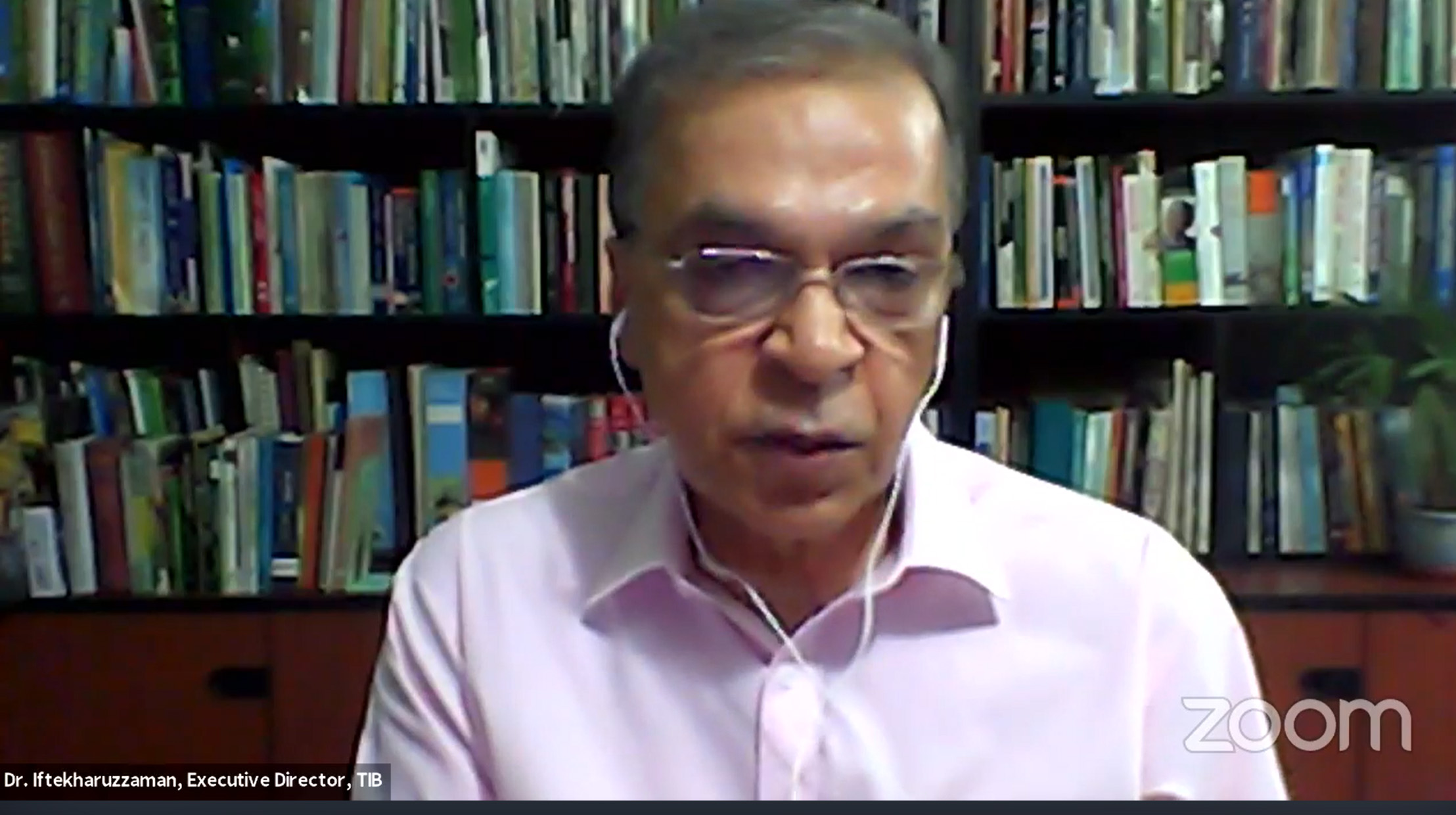Published: 11 August 2020

Lack of adequate supervision and monitoring, absence of a specific legal framework and conflict of interest of the lawmakers in implementing rural infrastructure development projects under the parliamentary seat-based allocated block fund encourage institutionalization of corruption and irregularities, thus causing waste of public funds.
A segment of lawmakers also exploits these projects as a means to exercise political power, ensure support in the election, and gain financial advantages.
These findings came up in a recent TIB research study titled ‘Governance Challenges in the Implementation of the Infrastructure Development Project under Constituency-Based Block Allocation’, released during a virtual press conference on 12 August 2020.
Following qualitative and quantitative research methods, the study reviewed the governance challenges in planning, implementation, and monitoring schemes under the Important Rural Infrastructure Development Project (IRIDP). Randomly selecting 50 out of 300 parliamentary constituencies, the study was conducted until March 2020 under the four governance indicators, i.e., transparency, accountability, participation and practice of integrity with the data collected from May to December 2019.
Observing randomly selected 628 schemes worth Tk 298 crore under the first and second phases of the IRIDP, the study noticed that most of the schemes were only related to the rural infrastructures like roads, bridges and culverts.
Staggeringly, no schemes were taken on three other objectives of the project, like increasing production of agricultural and non-agricultural products, marketing facilities for the products and accelerating rural employment.
Citing the study at the conference, TIB Executive Director Dr. Iftekharuzzaman said, “Lawmakers’ primary role is to make law, act as public representatives in the parliament and ensure accountability of government. But if they get directly involved in public procurement-related activities and other development projects, it prevents them from ensuring government accountability.
“Conflict of interest arises when lawmakers get involved in the tender business and directly engaged in the projects run with the public money, and hence it becomes difficult to ensure transparency and accountability of government’s development projects,” he added.

The study finds that 68 per cent of the schemes were implemented within the stipulated time given in the tender, whereas 32 per cent needed extra time.
Meanwhile, 74 per cent of the schemes were completed fully and 21.5 per cent partially. 76.2 per cent of the schemes were supervised during implementation.
The study observes that the work quality of 41.8 per cent of schemes was "good", 28.6 per cent was "not good or not bad", and 29.6 per cent was “not good”, although the project report mentioned work of all schemes as satisfactory. Besides, only 14.5 per cent of all schemes involved repair works, and of the unrepaired, 42 per cent of the schemes were not in decent condition.
According to the study, in some areas, 20-25 per cent of work was illegally sold to influential people of the constituencies without keeping any proof of subcontract in official documents, although supervisors of implementing authority were aware of this.
Besides, lack of supervision by some MPs was observed due to nepotism, extra-legal commission/ dividend from contractors, and maintaining control of the constituency during polls by party leaders-workers. Even if the parliamentarian of a specific constituency takes initiatives to monitor the progress of work and resolve complaints, a segment of lawmakers favour irregularities to exert political influence and for financial gains.
There is a lack of initiative and interest in disclosing information on irregularities due to legal impediments, fear of false charges and harassment. No complaints were lodged against 77.6 per cent of the schemes despite having objections about the quality of work, reasoning that officials concerned ignore complaints due to the nexus between contractors and officials and fear of threats and harassment while protesting or directly filing a complaint.
Besides, if the contractor for the project is a relative or acquaintance or party worker of the concerned MP, general people are less interested in filing any complaints out of fear. Despite complaints, there was no visible change in the quality of work in 76.1 per cent of schemes, the study added.
The study observed that kickbacks at fixed rates, sometimes as lump sums, were transacted among various stakeholders at different stages of tenders and withdrawal of final bills and security deposits. Although e-tendering has been introduced to curb corruption, irregularities exist systematically where supervisory bodies, contractors, lawmakers, local public representatives and influential syndicates are involved.
There were allegations that the parliamentarians have received one-time kickbacks directly deposited to the party fund or through their assistants from contractors.
Highlighting the study findings, Dr. Zaman said, “Parliament members are considering these development projects as their right and thereby exploiting this to increase their local influence and power, protect the corruption of local leaders and for their financial gain.”
“Specific laws and policies must be formulated to resolve the conflict of interest issues, and rules should be strictly implemented to ensure the integrity and ethical conduct of the people's representatives,” he further added.
The study also made nine-point recommendations addressing the challenges of good governance in the implementation of the schemes powered by block allocations, which included, among others, making an impartial and comprehensive evaluation of the projects under block allocation, formulation of specific legal frameworks or policies, detailing instructions for the scheme selection process, formulation of schemes based on geographical location and appropriateness, representation of local people in relevant coordination committees to ensure people's participation and a reduction of political influence in the decision-making process, disclosure of project information.
TIB Research and Policy (R&P) Programme Manager Juliet Rosetti presented the findings while

Executive Management Advisor Professor Dr. Sumaiya Khair, R&P Director Mohammad Rafiqul Hassan, and R&P Senior Programme Manager Shahzada M Akram have also attended the conference.







